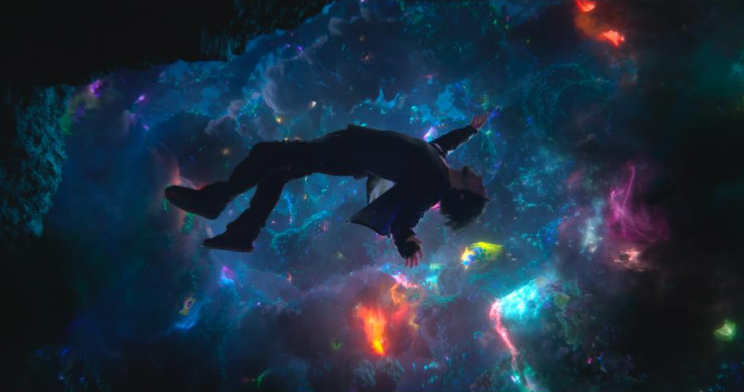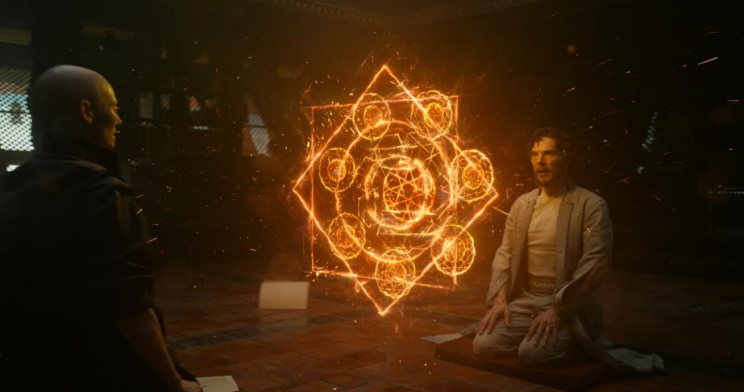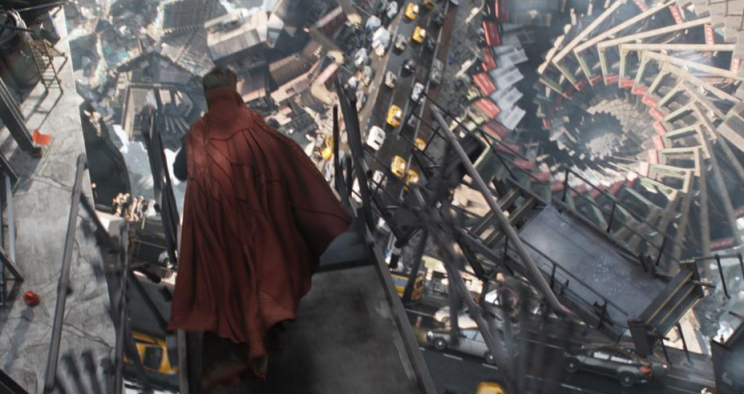'Doctor Strange' Consultant Explains Science Behind Marvel Blockbuster's Mind-Blowing Multiverse

Marvel’s Doctor Strange is a movie about a surgeon who becomes a mystical sorcerer with the ability to travel between different dimensions. Nonetheless, when it came time to craft its otherworldly script, director Scott Derrickson enlisted a scientist to help develop the push-pull between its hero’s rational worldview and his newfound magical powers. That expert was Alan Frank, a professor of physics and astronomy at the University of Rochester (as well as a regular contributor to NPR and The New York Times) who — thanks to his long-standing relationship with the filmmaker — served as a consultant on the superhero saga. In advance of Doctor Strange’s home-video release (Feb. 14 on Digital HD; Feb. 28 on Blu-ray and DVD), we spoke with Frank about consciousness, the multiverse, and whether humans can look forward to a future of astral projection.
Were you always a big comics fan, even before your Doctor Strange consultancy came about?
Alan Frank: Yes, I’m a fan going way back. I have a lot of memories of going down to the corner store — or the corner kiosk – and buying Marvel. I got into buying comics when I was about 11 or 12, and my dad was a writer, and he was always going, “Oh man, why are you reading those things?” And I’d say, “Oh no, Dad. They’re really great. They’ve got big words. I just learned the word ‘synopsis’ from this! [laughs]”
The story I love to tell is, when my kids were growing up, we were just as likely to read the Iron Man origin story as we were to read Goodnight Moon. My kids know all the origin stories. And I’ve been a big fan of the movies too. So when the opportunity came to be a consultant, I was totally pumped.
Was Doctor Strange, in particular, always a title you loved? Or were you more of a DC guy…
Oh no, not DC! I’ve never been a fan of DC. The great thing about Marvel was always the fact that they were embedded in the real world — you know, Spider-Man is swinging around NYC. With Marvel, the characters had real problems. Getting superpowers just made your life worse, you know? [laughs] I loved that vision — that you’re just a regular jerk, but you have superpowers and you feel like you have to do something good with them. So it’s always been Marvel.
Related: What ‘Doctor Strange’ Means to the Marvel Cinematic Universe
But the interesting thing was, Doctor Strange was not one of my favorites. I hardly ever read Dr. Strange, because it was about magic, and I was a young science kid. You know, I wanted to be bitten by a radioactive spider or build myself a super-technological suit. I was a young reductionist physicist.
Given that disinterest, how did you get involved with Dr. Strange? Did you have any prior experience working as a movie consultant?
Because I do a lot of popular writing for NPR and The New York Times — and I’ve also written a few books — I’ve had a number of times when I’ve worked with artists on novels, or plays. Although this was my first experience with movies.
The story of how I got involved with this has to do with my first book. I’m not a reductionist anymore — I’m a lapsed reductionist. And my first book was about science and spirituality. Somebody gave [Doctor Strange director] Scott Derrickson that book, because I’m an atheist with an interest in human spiritual endeavor, and Scott is a theist — you know, he’s religious — with a strong interest in, and appreciation for, science. We started talking 10 years ago, and sometimes when I’d come to L.A., we’d maybe get dinner and talk more, and we’d exchange books over the years. And a couple of times, he had the idea to have me consult on something, but nothing happened with those.
So when he got tapped for Doctor Strange, he contacted me, and asked if I’d be interested. And I was like, “Yeah!” Even though Doctor Strange wasn’t my favorite, I loved the idea of what could be done with it. Because there’s a major problem with Doctor Strange, which is that Marvel has built its universe with these very science-y rules. For example, Thor is not a god; he’s just like a super-advanced alien. So how do you include Doctor Strange — who is explicitly drawing from occult powers — into that universe? When Scott asked me if I wanted to be a part of it, we immediately started talking about the ways to do that.
Related: The Crazy Way the ‘Doctor Strange’ Director Learned the Plot to ‘Infinity War’
What specific story issues did he want your input on?
There were two things we really wanted to work on. The first was this idea of how to ground Doctor Strange in the Marvel universe. There’d been discussion about whether his powers should come from him having some super neurological make-up, or something — but that would have undone the inherent mystery of his magical powers. So for me, the place to think about it was via the nature of consciousness. Because right now, we do not have a theory of consciousness. We have neuroscience, which is awesome and powerful — but that’s not a theory of consciousness. We don’t really know the relationship between brain and mind — by brain, I mean the goop, the meat, and by mind, I mean this awareness, and self-awareness, that we have.
We spent a lot of time talking about that idea. And there’s room there for us to ground Doctor Strange’s powers. We spent a lot of time talking about that first meeting between Strange and the Ancient One, where he’s coming in with his reductionist view that the world is just random bits of matter in an uncaring universe, and she just blows him out of his body with that. We really talked about what language he was going to use when he faced her, and what language she was going to counter with. That really is reflected in that scene. And also, the idea of the different maps. I love that, because we don’t have a theory of consciousness; there are many ways of looking at what it is to be aware. What are these energies of awareness?
The other thing we worked on was the very science-y idea of the multiverse, because there is a whole scientific idea around all of that. How you would want to use that idea for the plot.
Related: A ‘Doctor Strange’ Glossary: Your Ultimate Guide to Movie, From Astral Planes to the Vishanti
How do you deal with the multiverse? Can you explain how much of that is rooted in science, versus fantasy — because we’re obviously treading a fine line here.
My view about the use of science, and science ideas, in movies is that it depends on the movie. If you’re doing The Martian, you better get the science right, because that whole movie is predicated on this-is-what-it-could-really-be-like. But if you’re doing a superhero movie, and you’re going to deal with the multiverse, you do not need to get the accurate details of the latest theory correct.
There are a couple of different versions of the multiverse in physics, all of which are theoretical. Most physicists do not believe there is a multiverse, but it’s a theoretical idea that’s been bouncing around. The most common version has to do with cosmology, and the idea that multiple universes, each with their own set of physical laws, emerged from the Big Bang. And ours is just one of them. I’m not very fond of that theory — there’s no evidence for it. I think, in some sense, it’s more an excuse for dealing with bad things in the theory than there is a reason to believe in it. But that’s just my scientist view of it.
But what Marvel did that was great was, they just brought up that idea — that you may have a universe of infinite spatial dimensions, and each of the different subsets of those spatial dimensions could be a separate universe. We live in a three-dimensional reality, and if our three-dimensional reality is embedded in a 500-dimensional space, then our three-dimensional reality and some other three-dimensional reality will coexist in that 500-dimensional space, but we would never know about the other one. That is just a cool idea! And to use that idea for your fictional superhero narrative is just totally awesome.
So what’s good about Doctor Strange is that it draws from the way scientists think about reality and think about space and dimensions, and then it builds upon it. It doesn’t have to be scientifically accurate; it just needs to draw from the spirit of what scientists think about.
That’s what a lot of Marvel does, because we know Iron Man’s suit isn’t technologically feasible, and that gamma radiation won’t turn you into a green monster…
That’s what makes the Marvel universe so amazing — it’s about universe building. It’s not that you get the science right; it’s that you build a science that’s self-consistent. That draws from the best or most interesting ideas from real science, but then your fictional universe has a set of rules, and a science, that it sticks to. That way, it doesn’t say that you can fly using gamma rays one day, and then the next day you can’t fly using gamma rays. Marvel has been studious and meticulous about building their physics.
Related: How ‘Doctor Strange’ Turned Trippy Comic Art Into 3-D Animation
As a scientist, the best thing I love about Marvel is they’re very respectful of science. We’re in a world where we’re now fighting against the idea of “alternative facts” — right now, the entire enterprise of science is kind of under threat. And Marvel has built this universe where science is valued, where science is important, where science is how you do amazing things. In that way, I’ve always been really thankful to Marvel for what they’ve done.
The relationship between the mind and body is ever-present in Doctor Strange – including, as you said, in the scene in which the Ancient One knocks Strange’s spirit out of his physical form. How does that dynamic play into your ideas about consciousness? Because I’m not sure I have a full grasp of what consciousness is…
Nobody does! Now, look, astral projection — no. For me, no way. [laughs] I’m still a hardcore scientist, and I do not think you can astrally project. I do not think you can teleview. Of course, I could be wrong about my worldview [laughs]. Those are all great things for a movie about a magician superhero. But there’s no science behind those — I mean, not even close.
William James, who was one of the founders of psychology and a brilliant philosopher, has this famous quote. He was asking, what is the relationship between the brain and the mind? And he said, well, it could be like circuitry, which is the dominant view. But it could also be like a radio, and an antenna. And he also said it could be like a trigger — the brain may be a trigger for the mind. So there are other ways of conceptualizing this relationship between the brain and the mind that don’t necessarily involve having astral travel.

So just to be clear: your position is there is NO astral projection.
[laughs] Yeah, I do not think you can astrally project — full stop. Now people are perfectly happy to disagree with me; I’m just saying that’s not part of my universe.
That’s too bad.
You know, this is always my thing. People want to believe there are ghosts, or UFOs, and I’m like, “Look, the universe is already interesting enough!” I don’t need to add conspiratorial aliens visiting the Earth; all you have to do is look at the moon — that is pretty amazing. Why don’t you just look at your hand, and the muscles that contract. People need to see what’s already in front of them as a miracle, you know? You don’t need to add anything to it. Go take a walk in the woods if you want to see, like, the MOST AMAZING THING EVER. We should pay attention to what’s already in front of us; that’s stunning and bizarre enough.
Did you get to visit the set, or were you primarily involved in the earlier script stages of the project?
I was mainly working earlier. They sent me the script, and they flew me out to Hollywood — which was awesome in itself. I live in upstate New York, and when they were filming in Manhattan, they called me, but I was out of town, doing science stuff at a conference. “Dude!”
Your one chance to hang out with Doctor Strange…
I know! But what’s funny is, there was an event right before the movie was coming out, in Hollywood, which they flew me out for. There were no stars, but it was a big Hollywood thing, with the National Academy of Sciences Exchange, which hooks up scientists and Hollywood writers. So it was all the writers, but everybody was kind of nerdy [laughs]. Because all the writers are like me — they’re science fiction fans. They’re not all super-cool handsome people; they’re all nerdy guys and women who just looooove science fiction and comic books. I thought that was funny — it had the veneer of Hollywood, but everybody in the room… the only difference between the writers and the scientists were, the writers had better clothes on. But we were all nerds.

Do you have any future plans with Marvel, or Doctor Strange in particular?
We haven’t talked about anything distinct. My thing is, I love Marvel so much, if they call, I’ll be on the next plane. But on the other hand, because of all my work with NPR and The New York Times — and I’ve got a big research group, I’ve got graduate students and got a lot of research going on — I’m almost scared they’re going to call [laughs]. But if they call, I’m there on the next plane.
You’re not turning down Avengers: Infinity War, if the opportunity arises.
No. Not going to happen.
Related links:

